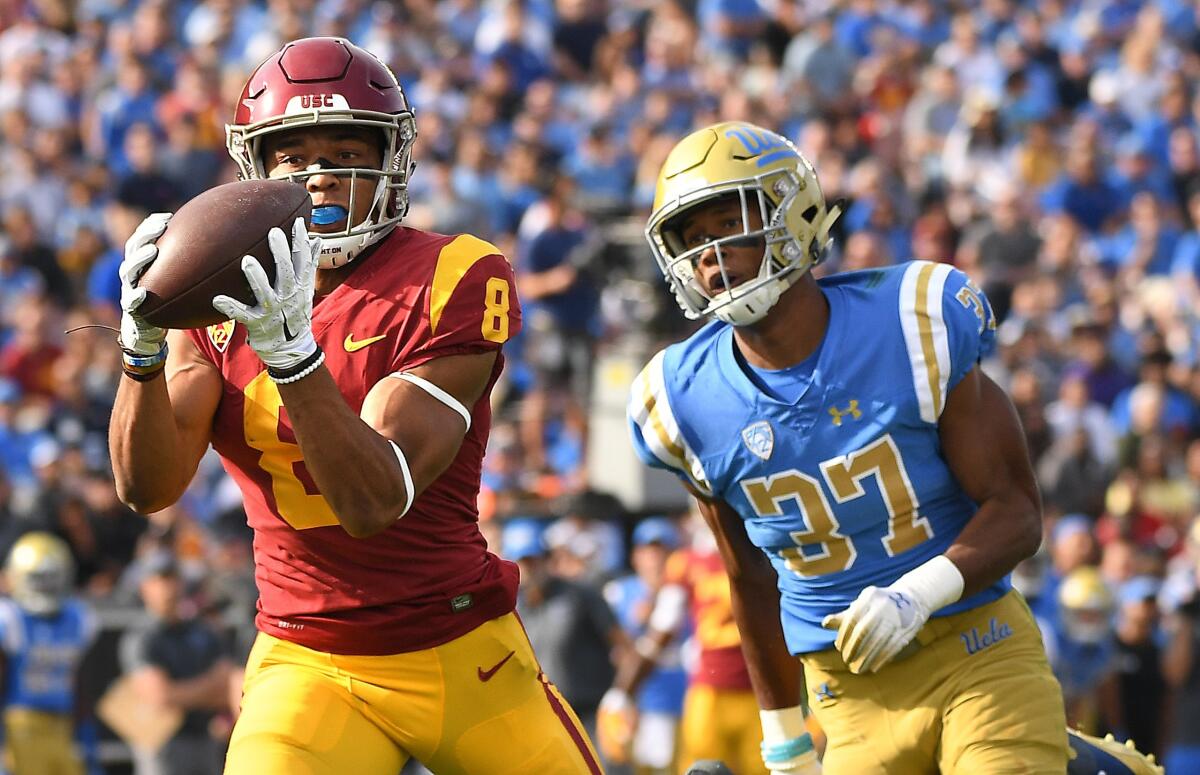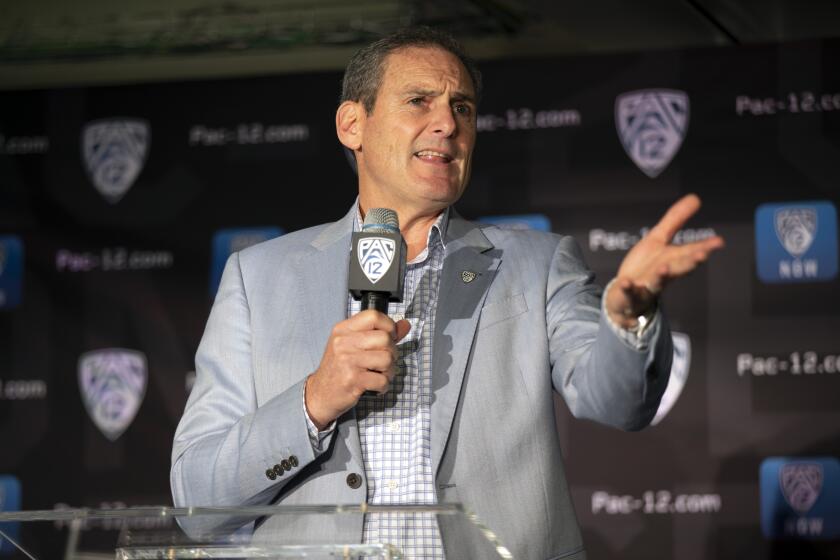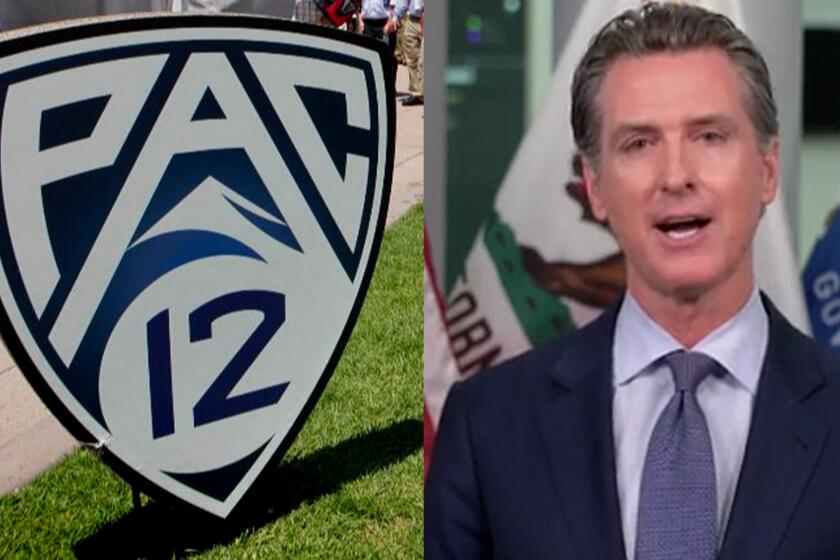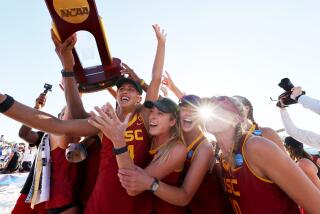USC, UCLA ADs team up to revive hopes for a college football season in fall

The day began with the Pac-12 sitting alone, the only Power Five conference still sticking with its decision to postpone the fall football season.
But after all of the twists and turns on a wild Wednesday, after the hand-wringing and conflicting statements and political posturing, the athletic directors from USC and UCLA sat on a Zoom call together with Los Angeles County health officials in the evening, determined not to let their shared city’s COVID-19 regulations be the last remaining roadblock to the Pac-12’s potential comeback.
That collaboration, between USC’s Mike Bohn and UCLA’s Martin Jarmond, appears to have successfully cleared the way for both schools to soon return to football practice in Los Angeles six months after the pandemic shut down their spring practice sessions.
A person with direct knowledge of the call said that neither state nor L.A. County health officials would prevent the two schools from returning to full-team, contact practices. State and local restrictions had previously limited the two programs, as well as Stanford and California, to only non-contact practice outside, in groups of 12 players or fewer.
The notion of clearing those bureaucratic hurdles in time to join the Big Ten Conference — the Pac-12’s companion in coronavirus caution — in a fall restart appeared no more than a pipe dream until Wednesday night. But in combining forces, Bohn and Jarmond, each in their first year as their school’s athletic director, appear to have helped steer the Pac-12 back on a path toward playing sometime this autumn.
On the day the Big Ten announced it would play fall football, the Pac-12 said discussions with officials created optimism about the conference playing this season.
News of the call between the athletic directors and the county officials was first reported by the Bay Area News Group.
A vote on the conference’s return could happen as soon as Friday, when the Pac-12 CEO group of presidents and chancellors is scheduled to meet, with football expected to be the main topic.
Urgency across the conference spiked early Wednesday, when the Big Ten announced it voted unanimously to reverse course and return for an eight-game schedule beginning on Oct. 24 weekend.
In response, Pac-12 Commissioner Larry Scott released a statement that summed up his league’s pandemic plight: “At this time, our universities in California and Oregon do not have approval from state or local public health officials to start contact practice. We are hopeful that our new daily testing capability can help satisfy public health official approvals in [those states] to begin contact practice and competition.”
Later Wednesday afternoon at a news briefing, Gov. Gavin Newsom addressed the state guidelines’ impact on the Pac-12, saying, “Now, this manifests very differently depending on the sport. Basketball, cohorting of up to 12, may be a little easier than football up to 12. But offensive teams, defensive teams are able to coordinate and practice, and the like. And so I want to make this crystal clear, nothing in the state guidelines deny the ability for the Pac-12 to resume. Quite the contrary. That has been a misrepresentation of the facts.”
Twenty-two players are needed on the field in close proximity to practice or play a football game. Newsom and Scott spoke Wednesday, and, according to a person with direct knowledge of the conversation, the governor told Scott he was committed to working through any issues relating to cohort size due in part to the efforts the Pac-12 had made to secure a daily antigen testing program.
Later, Charles Boyle, a spokesman for Oregon Gov. Kate Brown, sent a statement about the matter, saying, “Representatives from the University of Oregon and Oregon State University athletic departments met with the Oregon Health Authority this afternoon to discuss their COVID-19 health and safety plans for their football teams. The universities have asked for an exemption to OHA’s sports guidance, just as Oregon’s professional sports teams have been given. We have granted that request, and, under the new guidance, OHA must receive written plans for approval.
“Let me stress that, up to this point, we have received no written operating procedures for approval from the Pac-12 for the upcoming season under the new guidance, and we have no details from the conference about their new rapid testing proposal. Until we have those details, we can’t move forward in the process.”
By day’s end, Scott was confident enough in what he heard from the governors to issue a fresh statement, oozing with optimism.
“The Pac-12 welcomes today’s statements … that state public health officials will allow for contact practice and return to competition, and that there are no state restrictions on our ability to play sports in light of our adherence to strict health and safety protocols and stringent testing requirements,” Scott said.
“We appreciate Governor Newsom and Governor Brown’s support, the former of which is consistent with the very productive conversation that he and I had earlier today. Our California and Oregon universities will now each individually and immediately reach out to their relevant county public health officials to seek clarification on what is required to achieve the same clearance to resume contact practice and competition.”
For the conference to start its season in the range of the Big Ten’s new start date, which would allow its teams to have a chance to compete for the College Football Playoff, the belief was that schools in California and Oregon would have to hit the turbo button on preparation.
As it turned out, both already had their fingers over that button.
Like the Big Ten, the Pac-12 has vastly improved its testing capacity, through a deal with Quidel Corp., that could be in place by the end of September. But that doesn’t change the reality that many players across the league have not been a part of an actual football practice in months.
“Have not seen my locker or helmet since March — with all due respect,” USC offensive lineman Jalen McKenzie said on Twitter, in response to a linked article about Newsom’s Wednesday comments.
On Tuesday, with buzz building for a Big Ten reboot, USC players penned a letter to Newsom, saying, “Let’s find a way to say, ‘yes!’ Please let us play.” Newsom reached out to USC officials Wednesday in response, according to a person with direct knowledge of the conversation.
While the Pac-12 supporters will have to wait for more clarity on their fall football prognosis in the coming days, college football-starved fans in Big Ten country celebrated joining the Atlantic Coast Conference, Big 12 Conference and Southeastern Conference in planning to play.
California Gov. Gavin Newsom declares there’s nothing in the state’s coronavirus guidelines that’s stopping the Pac-12 from playing football.
The Big Ten presidents cited three factors in their turnabout from their Aug. 11 decision to postpone:
Players and staff will now be able to undergo daily antigen testing, with results completed and recorded prior to each practice and game. Anyone who tests positive will be subject to in-depth cardiac examination to detect myocarditis, inflammation of the heart that has been linked to having COVID-19. The league also established data thresholds for when to shut down competition, determined by team positivity rate (greater than 5%) and population positivity rate (greater than 7.5%) based on a seven-day rolling average.
If a team hits both of those thresholds, it will have to shut down for at least a week. Players who test positive will have to sit out for a minimum of three weeks.
The Big Ten will release its schedule later this week. With the Oct. 24 start, the league left itself little margin for error in keeping the virus from wreaking havoc on the season by having no built-in bye weeks on the road to championship weekend Dec. 19. The Big Ten is hopeful that its daily testing capability will squash the potential for outbreaks within each program.
Times staff writer Ben Bolch contributed to this story.
More to Read
Go beyond the scoreboard
Get the latest on L.A.'s teams in the daily Sports Report newsletter.
You may occasionally receive promotional content from the Los Angeles Times.














